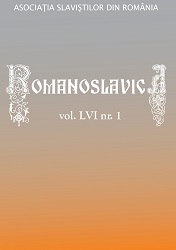Православная Славия на пороге нового времени: смена культурной парадигмы
Slavia Orthodoxa on the Treshold of Modern Time
Author(s): Anna KretschmerSubject(s): Russian Literature, Eastern Slavic Languages, South Slavic Languages, Eastern Orthodoxy, Philology, Sociology of Literature
Published by: Editura Universităţii din Bucureşti
Keywords: Slavia Orthodoxa; literature of pre-standard periods; diglossia; text corpus;
Summary/Abstract: This paper deals with a model of pre-standard periods of literacy by the Orthodox Slavs, developed by author. The model is based on the theory of Slavia Orthodoxa by N. I. Tolstoj and Riccardo Picchio. They consider the written culture of that area (that had in its earlier periods included Romanians, too)and its literature as strictly homogenous and closely tied to Orthodox religion. This literature has exist during many centuries - canonized and almost unchanged, just because of its religious character. This culture and its paradigma are of a very different kind than that of Non-Orthodox Slavia, as well of West Europe. In this paper the main distinctive features of this older orthodox Slavic culture are presented and analyzed, including its very special language situation, that is usually called diglossia (in terms of Ch. Fergusons theory of 1959, in 1980-ies adapted for the older Slavia Orthodoxa by B. A. Uspenskij). The area of Slavia Orthodoxa, though very homogeneuos in its culture, shows yet some variety. This subject has not been in focus of scientific interest yet. Our paper deals with this variety, too. So, we differ between the so called „motherland“- areas, on the one side, and „island“-areas, on the other. Examples for the latter are East Slavs outside of Moscow Russia, as well as Serbs in Austria. The distinctive features if that two island-cultures are presented in this paper - compared to the culture of Moscow Russia resp. Serbian culture under Turkish rule. The older Slavic orthodox culture and literature - the subject, this paper deals with, is a very complex one. So it demands a complex approach, too: the borders of the contemporary national Slavic cultures are too narrow for such an approach.
Journal: Romanoslavica
- Issue Year: LVI/2020
- Issue No: 1
- Page Range: 27-40
- Page Count: 14
- Language: Russian

